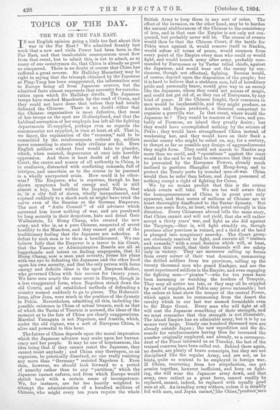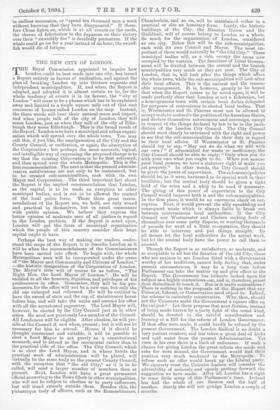TOPICS OF THE DAY.
THE WAR IN THE FAR EAST.
IS not English opinion going a little too fast about this war in the Far East P We admitted frankly last week that a new and virile Power had been born in the Far East, and that incalculable consequences must flow from that event, but to admit this, is not to admit, as so many of our countrymen do, that China is already as good as conquered. There is no doubt of course that China has suffered a great reverse. Sir Halliday Macartney may be right in saying that the triumph obtained by the Japanese at Ping-Yang has been exaggerated, the information sent to Europe being all from Japanese sources, but the admitted facts almost supersede that necessity for corrobo- ration upon which Sir Halliday dwells. The Japanese troops have reached Manchuria by the road of Corea, and they could not have done that unless they had totally defeated the Chinese. There is no doubt either that the Chinese organisation is most defective, that most of her troops on the spot are ill-disciplined, and that the habitual corruption of her employes has left all the fighting departments ill supplied, perhaps even as regards the commissariat not supplied, in time at least, at all. That is, we fancy, the explanation of the " excesses," said to be committed by the reinforcements ordered up, soldiers never consenting to starve while civilians are fed. Even English soldiers without food would take to plunder, which, when resisted, degenerates at once into horrible oppression. And there is least doubt of all that the Court, the centre and source of all authority in China, is in confusion, distracted with conflicting counsels, full of intrigue, and uncertain as to the course to be pursued in a wholly unexpected crisis. How could it be other- wise ? The Emperor, who is supreme, though he has shown symptoms both of energy and will is still almost a boy, bred within the Imperial Palace, that is, in a city full of slaves, wholly inexperienced, and exposed suddenly to a shock such as might have tried the nerve even of the Russian or the German Emperors. The sort of " Aulic Council " of old advisers which surround him know nothing of war, and are paralysed by long security in their despotism, hate and dread their Wallenstein, Li Hung Chang, who created the new army, and who is, as a pure Chinese, suspected of secret hostility to the Manchus, and they cannot get rid of the traditionary feeling that the Japanese are nobodies. A defeat by such men is to them a bewilderment. We can believe fully that the Emperor is a terror to his Court, that the Yamens or Administrative Boards are all at loggerheads and intent on finding scapegoats, that Li Hung Chang, now a man past seventy, forms his plans with one eye to defeating the Japanese and the other fixed upon his own security, and that the only person with fierce energy and definite ideas is the aged Empress-Mother, who governed China with fair success for twenty years. We have seen nearly the same scene in Europe, though in a less exaggerated form, when Napoleon struck down the old Courts, and all established methods of defending a country seemed suddenly to go to pieces. The Hohenzol- lerns, after Jena, were much in the position of the dynasty in Peldn. Nevertheless, admitting all this, including the possible existence in China of actual treason, such as that of which the Taotai of Tientsin is accused, the ideas of the moment as to the fate of China are clearly. exaggerations. Marshal Yamagata is not Napoleon, and Austria, which, under the old regime, was a sort of European China, is alive and powerful to this hour.
The future of China depends upon the moral impression which the Japanese advance may make upon her bureau- cracy and her people. It may be one of hopelessness, the idea being that if they cannot resist the Japanese, they cannot resist anybody • and China may thereupon, as an organism, be practically dissolved, no, one really resisting any more than " Germany " resisted Napoleon I. Even then, however, we should look forward to a period of anarchy rather than to any "partition," which the Japanese cannot enforce, and from which Europe would shrink back with a certain sense of incompetence. We, for instance, are far too heavily weighted to attempt the administration of a hundred millions of Chinese, who might every ten years require the whole British Army to keep them in any sort of order. The effect of the invasion, on the other hand, may be to harden the natural stubbornness of the Chinese to the consistency of iron, and in that case the Empire is not only not con- quered, but probably never will be. The course of events would then be that the Chinese Court, if the battle for Pekin went against it, would remove itself to Nankin, would refuse all terms of peace, would summon from every point of the Empire every man who could or would fight, and would launch army after army, probably com- manded by Europeans or by Tartar tribal chiefs, against the Japanese, and would wear out the enemy by con- tinuous, though not effectual, fighting. Success would, of course, depend upon the disposition of the people; but it is hard to believe that a stubborn race, full of hereditary pride and personally brave, would give way to an enemy like the Japanese, whom they could not accuse of magic, and could not get rid of, as they can of Europeans, by any kind of peace. If the Chinese fought, their resources in. men would be inexhaustible, and they might produce, as Austria and Spain produced, a General competent to organise a guerrilla war. In that event, where would the Japanese be P They would be masters of Corea, and pro- bably of Formosa, an island they greatly desire ; but they would have accomplished nothing by the seizure of Pekin ; they would have strengthened China instead. of weakening her, and they would have on their flank a. secular enemy who might be relied on, say, for a century, to thwart so far as possible any design of aggrandisement they might form. They could not march to Nankin any more than we could, and " operations" against the coast would in the end be so fatal to commerce that they would be prevented by the European Powers, already much inclined to garrison Shanghai and Hong-kong, and to protect the Treaty ports by ironclad men-of-war. China. would then be safer than before, and Japan possessed of nothing except a right of fighting for Corea. We by no means predict that this is the course which events will take. We are too well aware that. the homogeneousness of China is in great part only apparent, and that scores of millions of Chinese are at heart thoroughly disaffected to the Tartar dynasty. But there are some facts, at least, which point strongly in this, direction. Every Chinaman abroad tells the same story, that China cannot and will not yield, that she will rather accept a thirty years' war, and fight as she did against the Taepings,—that is, will fight steadily on, though province after province is ruined, and a third of the land is plunged into sanguinary anarchy. The Court group are obviously resolved to fight, and execute all " traitors and cowards," with a cruel decision which will, at least, produce this result, that their Generals will see safety only in victory. They are moreover calling up forces from every corner of their vast dominion, summoning the drilled soldiers from ten provinces, calling up the twenty thousand men who guard Kashgar, and are the most experienced soldiers in the Empire, and even engaging the fighting men—" pirates "—who for ten years have been harassing or watching the borders of Tonquin. They may all arrive too late, or they may all be crippled by want of supplies, and Pekin may prove untenable ; but the orders at least show the temper of the central Power, which again must be summoning from the desert the cavalry which in our last war seemed formidable even to Sir Hope Grant. Every man who will fight at all will cost the Japanese something of their strength, and we must remember that this strength is not illimitable. The island Empire has an admirable army, but it is by no means very large. Nearly one hundred thousand men are already outside Japan ; the new expedition and the de- mands for reinforcements having thus far increased the number originally employed, and already, as a correspon- dent of the Times informed us on Tuesday, the last of the trained reserves have been called out. Behind them again, no doubt, are plenty of brave conscripts, but they are not disciplined like the regular Army, and are not, as he hints, quite so content to be employed in foreign war. If China, recovering from her stupefaction, can get armies together, however inefficient, and keep on fight- ing, she will wear the Japanese army down, and that army, once extinct as a great force, cannot readily be replaced, cannot, indeed, be replaced with equally good men at all. An invading army withers, unless it is steadily fed with men, and Japan cannot,rlike Chinki'produce.men in. endless succession, or " spend ten thousand men a week without knowing that they have disappeared." If there- fore China fights on, which is at all events on the cards, the chorus of felicitation to the Japanese on their victory over their " unwieldly foe" is decidedly premature. If the whale could go on for a year instead of an hour, the sword- fish would die of fatigue.







































 Previous page
Previous page